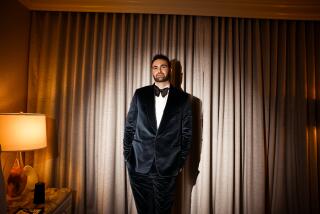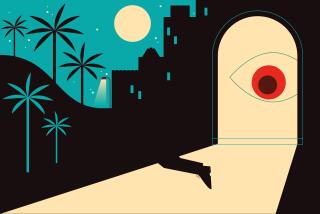‘Dustin’s Laws’ Are Tragicomic Look at Foibles of Jury Duty
- Share via
Dustin’s Laws of Jury Duty:
1. The probability of your receiving a jury duty summons in the mail is directly proportional to the degree to which you are looking forward to your vacation.
2. The probability of your being selected as a juror is inversely proportional to your desire to serve.
3. The probability of a jury reaching a verdict is directly proportional to the proximity of meal time.
“How to Avoid Jury Duty”
by Dan Dustin
Dan Dustin was peeved. He was riled. He was absolutely boiling.
Called for the first time two years ago to jury duty in San Diego County Superior Court, Dustin, chairman of the department of recreation studies at San Diego State University, had looked forward to fulfilling a solemn civic responsibility.
What he was dealt, instead, was a civic sucker punch.
Dustin watched as his fellow citizens wormed their way out of serving, as lawyers skewered jurors for ruling against their clients, as the simple business of meting out justice was, in his view, twisted beyond recognition.
He was indignant.
“I had this incredible compulsion to try to vent my feelings in some cathartic way, because I was so troubled by it all,” the intense professor, an expert in outdoor recreation and wilderness issues, recalled last week.
Dustin, 39, might have fired off an angry letter or composed a respectfully professorial treatise on the frustrations of the first-time juror. But he didn’t.
Rather, he authored a scathing, satirical indictment of the courts in the guise of a “how-to” book. “How to Avoid Jury Duty,” published this month, is a 79-page compendium of wisecracks, quiz questions, tongue-in-cheek advice, smart-aleck analysis, puzzles and cartoons--all intended, in its vinegar-sharp way, to get people thinking about how to restore the luster and dignity that, Dustin says, jury service has lost.
“I recognize the inconvenience of it all,” he said. “The whole issue seems to boil down to how important a process is this? Is it important that citizens be expected to serve this kind of a function? Yes, it is.”
The book is dedicated “to all the little people who are not important enough to get out of jury duty.” It offers pointers on avoiding a guilty conscience for slipping out of service, tips on how to avoid jury service and, finally, a step-by-step guide to getting dismissed from duty once some unfortunate gets as far as the jury box.
Some of Dustin’s suggestions: Don’t pay taxes or register your car, because jury pools often are drawn from taxpayer or auto registration lists. Borrow from the four-corner offense employed so effectively by the University of North Carolina basketball team and delay, delay, delay. Above all else, Dustin advises, convince court officials that you’re not responsible for your inability to serve.
“When it comes to excuses, the sky’s the limit,” he writes. “Just wave the flag. Ooze with sincerity. Be apologetic. Then, when you get your chance, get the hell out of there as fast as you can. Believe me. You won’t be alone.”
Such behavior, of course, is exactly the opposite of what Dustin considers appropriate. But it’s the sort of performance he observed over and over during the stint of jury duty that inspired the book--an observation borne out by a Superior Court official’s testimony in a recent criminal case that only 22% of the people summoned to jury duty last year in San Diego County served.
“I was very upset with the amount of people who simply wanted to get out of serving,” said Dustin, graying but outdoorsy in a wool shirt and khakis. “Incredible numbers just didn’t want to be bothered with the inconvenience of it all. They were very blunt, telling the attorneys they were likely to make a quick decision just to get back to the job, knowing that would get them out of it.”
In writing the book, a six-month chore, Dustin tried to exaggerate his observations into the realm of the absurd. Subsequently, he was horrified to discover that the bizarre twists of his imagination had parallels in real life.
He read, for instance, that a New York state legislator had introduced a bill barring the use of voter lists as a source of potential jurors, because--just as Dustin had sarcastically proposed--New Yorkers were canceling their voter registration to avoid jury duty.
Dustin sent the unpublished manuscript to an acquaintance--Arthur Frakt, dean of the Loyola Law School in Los Angeles. He did not know whether to be pleased with or frightened by the dean’s reaction.
“He called back and said, ‘It’s incredibly funny. And the reason it’s funny is that it’s all true,’ ” Dustin said.
Frakt consented to write a foreword to the book--an attempt, he said, to prove that even law school deans have a sense of humor.
“Now that the draft is in at least temporary abeyance, jury duty is the only constitutionally permissible form of involuntary servitude imposed on non-criminal free citizens,” Frakt wrote. “Even lawyers and law professors who have not been convicted of a felony have to heed the call to jury duty.”
Quotations from Frakt’s foreword, included in promotional material for the book, brought the dean some angry mail.
“I got reactions from a couple of judges and trial lawyers who hadn’t looked at it and just saw the title,” Frakt said. “They wrote me scathing letters about how I could join in an attack on the American judicial system at a time it was under fire.”
Frakt fired back. “It’s a pretty inexpensive book, and I think I sent both of them copies,” he said. “One was sheepish enough to apologize.”
Dustin is not looking for apologies for what he considers the mistreatment of jurors by lawyers and the legal system. He is looking, however, to recoup the $8,000 to $9,000 he invested to have the book printed after commercial publishers rejected it.
More importantly, he hopes to jolt other citizens into recognizing their responsibility to serve and to make lawyers realize that jurors deserve respect, not contempt, for their contributions to the system.
“I’d like to see us putting more pressure on citizens to be enlightened, to be involved, to hold themselves more accountable for their society,” Dustin said.
The attitude carries over into his professional writing. Dustin is a leading proponent of “non-rescue wilderness areas”--land set aside in remote parks where adventurous outdoorsmen can hike at their own risk, with no search and rescue services available.
No outback, though, could ever be as dangerous as the courtrooms Dustin lampoons in his book. There, on the jagged edge between justice and expedience, jurors are sheep, lawyers are ambulance chasers, and relief is spelled, “e-x-c-u-s-e-d.”
But Dustin, ultimately, is ready to stand at the embattled juror’s side. “Are you a stupid, hopelessly biased, untrustworthy sheep who has nothing better to do than being taken advantage of easily?” he asks in the book’s first pages.
His answer is unequivocal. “I don’t think so either.”
More to Read
Sign up for Essential California
The most important California stories and recommendations in your inbox every morning.
You may occasionally receive promotional content from the Los Angeles Times.













